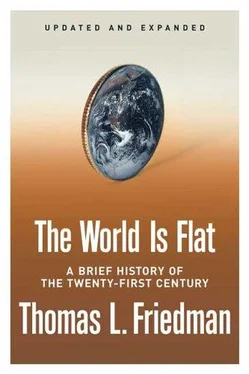The biggest source of friction, of course, has always been the nation-state, with its clearly defined boundaries and laws. Are national boundaries a source of friction we should want to preserve, or even can preserve, in a flat world? What about legal barriers to the free flow of information, intellectual property, and capital-such as copyrights, worker protections, and minimum wages? In the wake of the triple convergence, the more the flattening forces reduce friction and barriers, the sharper the challenge they will pose to the nation-state and to the particular cultures, values, national identities, democratic traditions, and bonds of restraint that have historically provided some protection and cushioning for workers and communities. Which do we keep and which do we let melt away into air so we can all collaborate more easily?
This will take some sorting out, which is why the point that Michael Sandel raises is critical and is sure to be at the forefront of political debate both within and between nation-states in the flat world. As Sandel argued, what I call collaboration could be seen by others as just a nice name for the ability to hire cheap labor in India. You cannot deny that when you look at it from an American perspective. But that is only if you look at it from one side. From the Indian worker's perspective, that same form of collaboration, outsourcing, could be seen as another name for empowering individuals in the developing world as never before, enabling them to nurture, exploit, and profit from their God-given intellectual talents-talents that before the flattening of the world often rotted on the docks of Bombay and Calcutta. Looking at it from the American corner of the flat world, you might conclude that the frictions, barriers, and values that restrain outsourcing should be maintained, maybe even strengthened. But from the point of view of Indians, fairness, justice, and their own aspirations demand that those same barriers and sources of friction be removed. In the flat world, one person's economic liberation could be another's unemployment.
India versus Indiana: Who Is Exploiting Whom?
Consider this case of multiple identity disorder. In 2003, the state of Indiana put out to bid a contract to upgrade the state's computer systems that process unemployment claims. Guess who won? Tata America International, which is the U.S.-based subsidiary of India's Tata Consultancy Services Ltd. Tata's bid of $15.2 million came in $8.1 million lower than that of its closest rivals, the New York-based companies Deloitte Consulting and Accenture Ltd. No Indiana firms bid on the contract, because it was too big for them to handle.
In other words, an Indian consulting firm won the contract to upgrade the unemployment department of the state of Indiana! You couldn't make this up. Indiana was outsourcing the very department that would cushion the people of Indiana from the effects of outsourcing. Tata was planning to send some sixty-five contract employees to work in the Indiana Government Center, alongside eighteen state workers. Tata also said it would hire local subcontractors and do some local recruiting, but most workers would come from India to do the computer overhauls, which, once completed, were “supposed to speed the processing of unemployment claims, as well as save postage and reduce hassles for businesses that pay unemployment taxes,” the Indianapolis Star reported on June 25, 2004. You can probably guess how the story ended. “Top aides to then-Gov. Frank O'Bannon had signed off on the politically sensitive, four-year contract before his death [on] September 13, [2003],” the Star reported. But when word of the contract was made public, Republicans made it a campaign issue. It became such a political hot potato that Governor Joe Kernan, a Democrat who had succeeded O'Bannon, ordered the state agency, which helps out-of-work Indiana residents, to cancel the contract-and also to put up some legal barriers and friction to prevent such a thing from happening again. He also ordered that the contract be broken up into smaller bites that Indiana firms could bid for-good for Indiana firms but very costly and inefficient for the state. The Indianapolis Star reported that a check for $993,587 was sent to pay off Tata for eight weeks of work, during which it had trained forty-five state programmers in the development and engineering of up-to-date software: “'The company was great to work with,' said Alan Degner, Indiana's commissioner of workforce development.”
So now I have just one simple question: Who is the exploiter and who is the exploited in this India-Indiana story? The American arm of an Indian consulting firm proposes to save the taxpayers of Indiana $8.1 million by revamping their computers—using both its Indian employees and local hires from Indiana. The deal would greatly benefit the American arm of the Indian consultancy; it would benefit some Indiana tech workers; and it would save Indiana state residents precious tax dollars that could be deployed to hire more state workers somewhere else, or build new schools that would permanently shrink its roles of unemployed. And yet the whole contract, which was signed by pro-labor Democrats, got torn up under pressure from free-trade Republicans.
Sort that out.
In the old world, where value was largely being created vertically, usually within a single company and from the top down, it was very easy to see who was on the top and who was on the bottom, who was exploiting and who was being exploited. But when the world starts to flatten out and value increasingly gets created horizontally (through multiple forms of collaboration, in which individuals and little guys have much more power), who is on the top and who is on the bottom, who is exploiter and who is exploited, gets very complicated. Some of our old political reflexes no longer apply. Were the Indian engineers not being “exploited” when their government educated them in some of the best technical institutes in the world inside India, but then that same Indian government pursued a socialist economic policy that could not provide those engineers with work in India, so that those who could not get out of India had to drive taxis to eat? Are those same engineers now being exploited when they join the biggest consulting company in India, are paid a very comfortable wage in Indian terms, and, thanks to the flat world, can now apply their skills globally? Or are those Indian engineers now exploiting the people of Indiana by offering to revamp their state unemployment system for much less money than an American consulting firm? Or were the people of Indiana exploiting those cheaper Indian engineers? Someone please tell me: Who is exploiting whom in this story? With whom does the traditional Left stand in this story? With the knowledge workers from the developing world, being paid a decent wage, who are trying to use their hard-won talents in the developed world? Or with the politicians of Indiana, who wanted to deprive these Indian engineers of work so that it could be done, more expensively, by their constituents?
And with whom does the traditional Right stand in this story? With those who want to hold down taxes and shrink the state budget of Indiana by outsourcing some work, or with those who say, “Let's raise taxes more in order to reserve the work here and reserve it just for people from Indiana”? With those who want to keep some friction in the system, even though that goes against every Republican instinct on free trade, just to help people from Indiana? If you are against globalization because you think it harms people in developing countries, whose side are you on in this story: India's or Indiana's?
The India versus Indiana dispute highlights the difficulties in drawing lines between the interests of two communities that never before imagined they were connected, much less collaborators. But suddenly they each woke up and discovered that in a flat world, where work increasingly becomes a horizontal collaboration, they were not only connected and collaborating but badly in need of a social contract to govern their relations.
Читать дальше












